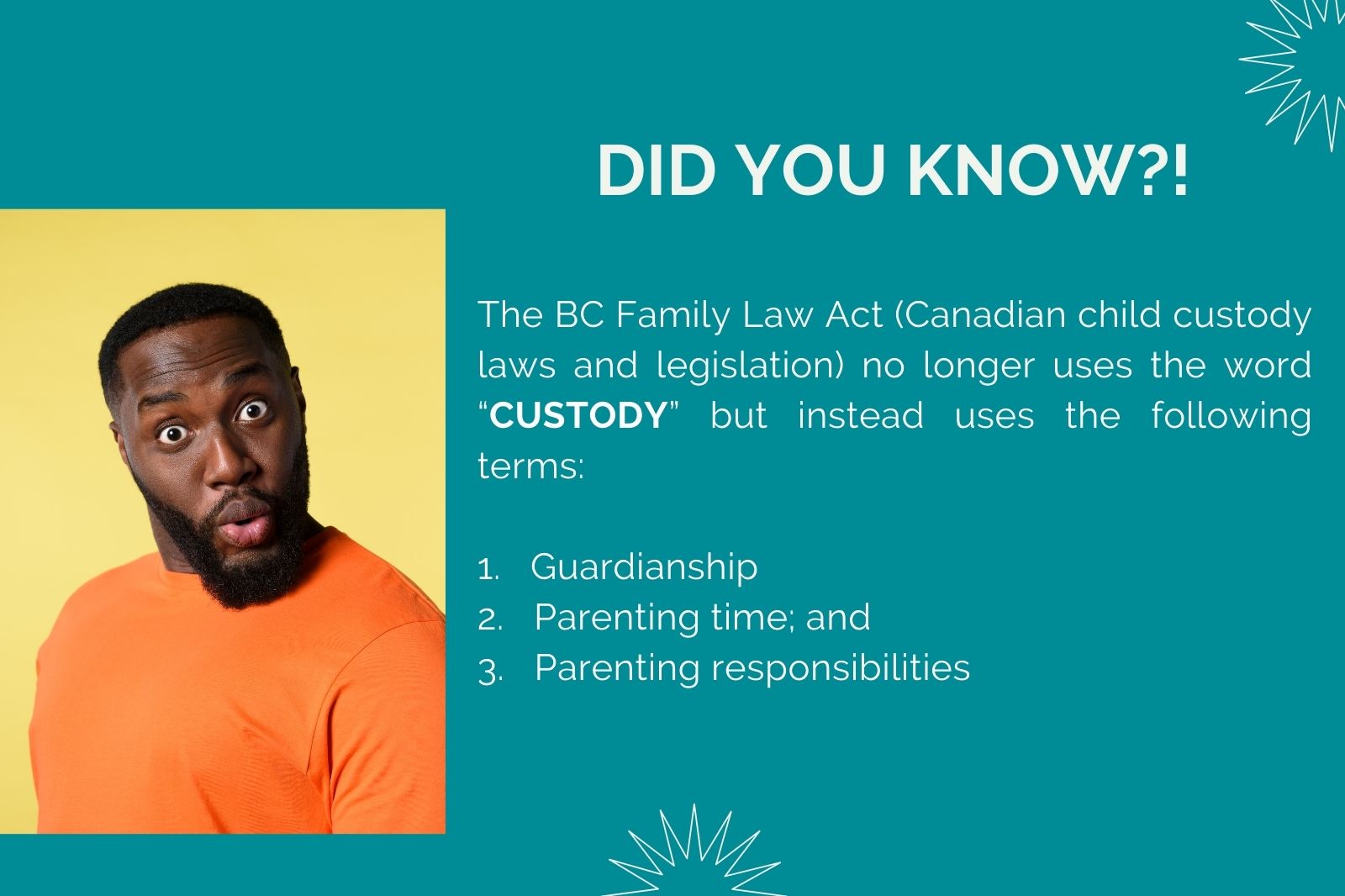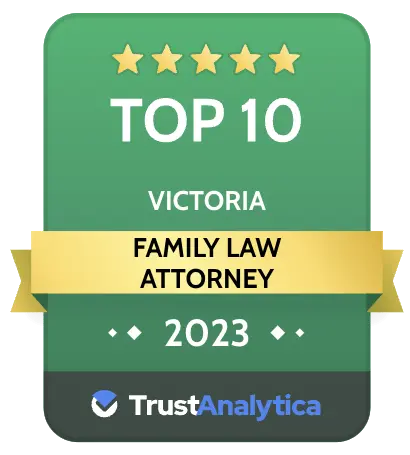Discover more. If your divorce is inevitable, choose the BETTER Path: join our newsletter for supportive, resolution-focused information!

Different Types of Child Custody
- Home
- Getting Custody
- Types of Custody
The different types of child custody in BC are many. It is worth mentioning right from the start, however, that for a lot of separating parents, they will ask their child custody law firm to get custody of their kids for them, but a lot of the time, the parents might not even know what sole custody v. shared custody means. So, before accidentally ending up in a high-conflict custody battle (which happens way too often, in our view) let’s define what custody really means, at least in BC.
When determining the different types of child custody, custody itself depends upon two things, which are:
- Parenting time - child custody schedules relating to how much time the child spends with each parent; and
- Decision-making - which parent has the authority to make big decisions affecting their kids.
Parenting time and decision-making most often work hand in hand and are always based on the best interests of the child.
Legal custody vs physical custody
When we discuss the different types of child custody, we are really talking about the parenting plan of which there are many different types. When reviewing your parenting plan (which happens to cover all matters relating to custody, including legal custody vs physical custody), we get the answers to the following questions:
- Who are the guardians of your children? (most often that will be you and the other parent, but not always . . . sometimes a grandparent is involved, for example).
- Who has the responsibility for making decisions about your kids? Are you sharing those decisions or does one of you have the primary responsibility for those decisions? What happens if you, as the parents, disagree as to the decision to be made? When we think of the word “custody” we are really referring to the responsibility for decision-making.
- And, of course, there are the different types of child custody schedules.

As divorce and child custody lawyers, at Pathway Legal, we spend a lot of time assisting clients like you in determining the meaning of custody and what will best suit your family. Only then do we decide with you which of the many different types of child custody we will be seeking.
Avoiding a child custody battle is always a great idea, and we do our best to navigate you through this process in as peaceful a way as possible. That is why we always hope to resolve and create your parenting plan using alternative dispute resolution processes including mediation for child custody. A clear understanding of the different types of custody and what that will mean for your kids is the best place to start.
What does sole custody mean?
What does sole custody mean, you ask? It means that one parent has the primary decision-making responsibility for their kids and most often coming along with that is the fact that the child custody schedule itself has the children spending the majority of their time in that one parent’s care. Although child custody schedules will sometimes still be relatively equal while one parent has sole custody, this is not always the case.
Because child custody schedules and sole custody often go hand in hand, if a parent has sole custody (decision-making responsibilities) they probably, in those instances, have the children living with them most of the time.
This is not always the case though. Like we said, sole custody might have less to do with the parenting schedule and more to do with one parent making all the major decisions relating to their child’s education, medical care, who they spend time with, and whether or not they will be raised in a religious faith.
When a parent is awarded sole custody it is often because the parents are at odds with each other so much that they cannot even agree upon relatively simple decisions for their kids.
When parents cannot agree on which extra-curricular activities the children should be involved in, which school they should go to, or whether or not the children should be granted access to particular medical treatments, the parents are often heading into a child custody battle where one parent will end up with the primary decision-making responsibility.
Legal custody vs physical custody case in point

Here is an example from one of our cases where legal custody and physical custody did not go hand in hand. It is the case where we represented someone I will call Audrey. Audrey and Brock were getting divorced in BC. They had one child, we will call him Oliver. Oliver was born with special needs that left him with delays in his speech, delays in his fine motor skills, and delays in his social development. Oliver also had some delays in his physical development.
Both Audrey and Brock loved Oliver very much, but Brock could not and would not accept that Oliver needed extra help to support his development. Brock believed that Audrey was exaggerating the special needs that Oliver had. He would not cooperate in any way to allow Audrey to obtain the help and resources that were recommended by Oliver’s pediatrician and medical team. Brock believed that Oliver just needed a little more time to develop. Brock also believed that Audrey was “using” Oliver’s special needs to gain attention for herself.
Brock refused to follow the guidance or recommendations of Oliver’s pediatrician and medical team. So, for example, when Oliver’s pediatrician recommended that Oliver go to speech therapy, Brock refused to accept that speech therapy was necessary. When Audrey booked Oliver for speech therapy, Brock refused to take him, and, in fact, tried to cancel the appointments.
Oliver’s pediatrician recommended equine-assisted therapy for Oliver (a therapy involving horses under the guidance of professionals, that is to assist children with disabilities in developing physical, emotional, and cognitive benefits). Audrey was thrilled when she found a facility that would assist Oliver without the therapy being very expensive. Brock refused to consent to the equine-assisted therapy and Oliver lost the opportunity.
Because they could not agree, Brock and Audrey ended up in a high-conflict custody battle with Oliver in the middle of it.
In that case, we were unable to resolve the matter using alternative dispute resolution and ended up in a courtroom with a judge deciding. After hearing from a parenting expert, and the child’s medical team, the judge decided that Audrey would have sole custody as to decision-making only but that the parties would remain close to a shared parenting schedule.
Because Brock clearly loved Oliver, the court felt that it was good for him to have significant parenting time, but it was in Oliver’s best interest that Audrey have sole legal custody (decision-making) while the parties shared parenting time on a close to equal basis.
Important Related Pages
Sole physical custody - benefits of primary physical custody
Sometimes there are circumstances when it is in the child’s best interest that parenting time is not shared between parents. That is, a child spends most, if not all of their time with one of their parents and not the other. When would this be, might you ask?
There are numerous circumstances when this might be the case.
As in the case of Brock and Audrey, the benefits of primary physical custody of Oliver being with Audrey makes more sense. This is because Oliver is likely to get the extra support he needs for his best chance of development.
Examples of sole physical custody
Here are some situations when the benefits of primary physical custody going to one parent over the other might be justified:
1️⃣When a parent has addiction challenges that impact their ability to parent their child.
2️⃣When a parent engages in parental alienation behaviours and tries to turn the child against the other parent (parental alienation is a form of abuse, by the way . . . it is a serious problem).
3️⃣When a parent abuses the child physically or emotionally.
4️⃣When a parent (see Brock and Audrey’s situation) fails to get a child the resources they require for their best development.
5️⃣When the parent neglects their child’s needs.
6️⃣When the parent has mental health challenges that impact their ability to parent.
7️⃣When a parent is involved in criminal activity that can endanger the child.
8️⃣When a parent keeps placing a child in the middle of the conflict they have with the other parent.
What does joint custody mean?
So, what does joint custody mean then, you ask? Well, again, just like the scenario with sole custody, joint custody has to do with decision-making for children. When parents have joint custody (also called shared custody), both parents share the responsibility about making important decisions for their kids. So, instead of one parent deciding which school the child should go to, for example, both parents make the decision together, by agreement.
Again, just as in sole custody, the child custody schedules will often go hand in hand with the decision-making responsibility.
For example, if parents share joint custody, that is if they share decision-making, they have a much higher likelihood of having a parenting schedule that is also shared, or in many cases, virtually equal time as the other parent.
Split custody

Then there is split custody. This is when the parents have more than one child, and each parent has primary care and decision-making responsibility for at least one of the kids. This is not as unusual as you might think. Sometimes, when children get older, they prefer to spend more time with one parent rather than the other. In such cases, maybe the children started out with child custody schedules that were shared between their parents’ homes, but then, over time that changed.
At Pathway Legal, our lawyers for child custody have seen this kind of situation fairly frequently when one child wishes to spend more time with the parent sharing the same gender as them. This might be the case when they get older. Other times, the parent has partnered with someone new and the child does not get along with the new partner, or the new partner does not get along with the child.
Summary of different types of child custody in BC
So, when looking at the different types of child custody in BC you have to turn your mind to what is best for you and most importantly, what is best for your kids. Child custody matters can be complex. At Pathway Legal, we always recommend that you seek the advice of a family law lawyer with alternative dispute resolution training so that you can navigate what can be a challenging time in a way that reduces unnecessary conflict.









